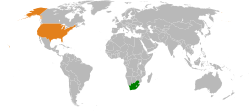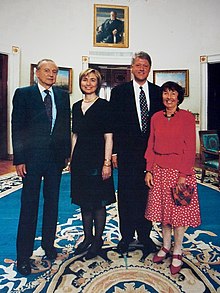South Africa–United States relations: Difference between revisions
m moved South Africa – United States relations to South Africa–United States relations over redirect: per recent changes to WP:MOS regarding how to space an endash |
|||
| Line 6: | Line 6: | ||
The United States has maintained an official presence in South Africa since 1799, when an American [[consulate]] was opened in [[Cape Town]]. The U.S. Embassy is located in [[Pretoria]], and Consulates General are in [[Johannesburg]], [[Durban]] and Cape Town. Americans and South Africans also have many non-governmental ties: black and white American [[missionaries]], for example, have a long history of activity in South Africa. South Africans (particularly the ANC leadership) also acknowledge support from and ties to the anti-[[apartheid]] movement in the U.S. |
The United States has maintained an official presence in South Africa since 1799, when an American [[consulate]] was opened in [[Cape Town]]. The U.S. Embassy is located in [[Pretoria]], and Consulates General are in [[Johannesburg]], [[Durban]] and Cape Town. Americans and South Africans also have many non-governmental ties: black and white American [[missionaries]], for example, have a long history of activity in South Africa. South Africans (particularly the ANC leadership) also acknowledge support from and ties to the anti-[[apartheid]] movement in the U.S. |
||
[[Image:SchwarzClinton.jpg|thumb|Ambassador [[Harry Schwarz]] with his wife, President [[Bill Clinton]] and [[Hillary Clinton]] in 1993]] |
[[Image:SchwarzClinton.jpg|thumb|Ambassador [[Harry Schwarz]] with his wife, President [[Bill Clinton]] and [[Hillary Clinton]] in 1993]] |
||
===Renewal of relations=== |
|||
| ⚫ | |||
[[Harry Schwarz]], who served as South African Ambassador to the United States during its transition to representative democracy (1991-1994), has been credited as having played one of the leading roles in the renewal of relations between the two nations.<ref>http://www.samedia.uovs.ac.za/Imagedir/Image4/1994/007/09915.tif</ref> Peter Fabricius described Schwarz as having "engineered a state of US/South Africa relations better than it has ever been”.<ref>http://www.samedia.uovs.ac.za/cgi-bin/getpdf?id=940042</ref> The fact that Schwarz, for decades a well known anti-apartheid figurehead, was willing to accept the position was widely acknowledged as a highly symbolic demonstration of President F. W de Klerk's determination to introduce a new democratic system.<ref>http://www.samedia.uovs.ac.za/Imagedir/Image4/1990/007/14163.tif</ref><ref>http://www.samedia.uovs.ac.za/Imagedir/Image4/1990/007/14253.tif</ref><ref>http://www.samedia.uovs.ac.za/Imagedir/Image4/1990/007/14445.tif</ref><ref>http://www.samedia.uovs.ac.za/Imagedir/Image4/1991/007/04818.tif</ref> During Schwarz's tenure, he negotiated the lifting of US sanctions against South Africa, secured a $600 million aid package from President [[Bill Clinton]], signed the [[Nuclear Non-Proliferation Treaty]] in 1991 and hosted President Mandela's state visit to the US in October 1994.<ref>http://www.samedia.uovs.ac.za/Imagedir/Image4/1994/007/05929.tif</ref> |
|||
| ⚫ | Since the abolition of apartheid and the [[South African general election, 2004|first-ever democratic elections]] of April 1994, the United States has enjoyed an excellent bilateral relationship with South Africa. Although there are differences of position between the two governments (regarding [[Iraq]], for example), they have not impeded cooperation on a broad range of key issues. Bilateral cooperation in [[counter-terrorism]], fighting [[HIV/AIDS]], and military relations has been particularly positive. Through the [[U.S. Agency for International Development]] (USAID), the United States also provides assistance to South Africa to help her meet her developmental goals. [[Peace Corps]] volunteers began working in South Africa in 1997. |
||
===Recent relations=== |
|||
On 28 January 2009, newly-elected US President [[Barack Obama]] telephoned his newly-installed counterpart [[Kgalema Motlanthe]] as one of a list of foreign contacts he had been working through since his presidential inauguration the previous week. Given primary treatment was South Africa's role in helping to resolve the [[2008–2009 Zimbabwean political negotiations|political crisis in Zimbabwe]]. According to White House spokesman [[Robert Gibbs]], the pair "shared concerns" on the matter. Obama credited South Africa for holding "a key role" in resolving the Zimbabwean crisis, and said that he is looking forward to working with President Motlanthe to address global financial issues at the upcoming [[2009 G-20 London summit]].<ref>Quoted in AFP 2009.</ref> |
On 28 January 2009, newly-elected US President [[Barack Obama]] telephoned his newly-installed counterpart [[Kgalema Motlanthe]] as one of a list of foreign contacts he had been working through since his presidential inauguration the previous week. Given primary treatment was South Africa's role in helping to resolve the [[2008–2009 Zimbabwean political negotiations|political crisis in Zimbabwe]]. According to White House spokesman [[Robert Gibbs]], the pair "shared concerns" on the matter. Obama credited South Africa for holding "a key role" in resolving the Zimbabwean crisis, and said that he is looking forward to working with President Motlanthe to address global financial issues at the upcoming [[2009 G-20 London summit]].<ref>Quoted in AFP 2009.</ref> |
||
Revision as of 00:37, 22 January 2012
 | |
South Africa |
United States |
|---|---|
South Africa – United States relations are bilateral relations between South Africa and the United States.
History
The United States has maintained an official presence in South Africa since 1799, when an American consulate was opened in Cape Town. The U.S. Embassy is located in Pretoria, and Consulates General are in Johannesburg, Durban and Cape Town. Americans and South Africans also have many non-governmental ties: black and white American missionaries, for example, have a long history of activity in South Africa. South Africans (particularly the ANC leadership) also acknowledge support from and ties to the anti-apartheid movement in the U.S.

Renewal of relations
Harry Schwarz, who served as South African Ambassador to the United States during its transition to representative democracy (1991-1994), has been credited as having played one of the leading roles in the renewal of relations between the two nations.[1] Peter Fabricius described Schwarz as having "engineered a state of US/South Africa relations better than it has ever been”.[2] The fact that Schwarz, for decades a well known anti-apartheid figurehead, was willing to accept the position was widely acknowledged as a highly symbolic demonstration of President F. W de Klerk's determination to introduce a new democratic system.[3][4][5][6] During Schwarz's tenure, he negotiated the lifting of US sanctions against South Africa, secured a $600 million aid package from President Bill Clinton, signed the Nuclear Non-Proliferation Treaty in 1991 and hosted President Mandela's state visit to the US in October 1994.[7]
Since the abolition of apartheid and the first-ever democratic elections of April 1994, the United States has enjoyed an excellent bilateral relationship with South Africa. Although there are differences of position between the two governments (regarding Iraq, for example), they have not impeded cooperation on a broad range of key issues. Bilateral cooperation in counter-terrorism, fighting HIV/AIDS, and military relations has been particularly positive. Through the U.S. Agency for International Development (USAID), the United States also provides assistance to South Africa to help her meet her developmental goals. Peace Corps volunteers began working in South Africa in 1997.
Recent relations
On 28 January 2009, newly-elected US President Barack Obama telephoned his newly-installed counterpart Kgalema Motlanthe as one of a list of foreign contacts he had been working through since his presidential inauguration the previous week. Given primary treatment was South Africa's role in helping to resolve the political crisis in Zimbabwe. According to White House spokesman Robert Gibbs, the pair "shared concerns" on the matter. Obama credited South Africa for holding "a key role" in resolving the Zimbabwean crisis, and said that he is looking forward to working with President Motlanthe to address global financial issues at the upcoming 2009 G-20 London summit.[8]
Principal U.S. officials
- Ambassador – Eric M. Bost
- Deputy Chief of Mission – Donald Teitelbaum
- Commercial Counselor – Craig Allen
- Economic Counselor – Perry Ball
- Political Counselor – Raymond L. Brown
- Management Counselor – Russell LeClair
- Public Affairs Counselor – Mary Deane Conners
- Defense and Air Attache – Colonel Michael Muolo
- USAID Director – Carleene Dei
- Agricultural Attache – Scott Reynolds
- Health Attache – Mary Fanning
- Consul General Cape Town – Helen LaLime
- Consul General Durban – Eugene S. Young
- Consul General Johannesburg – Steven P. Coffman
See also
Further reading
- U.S. Relations with South Africa: Books, documents, reports, and monographs by Y. G.-M. Lulat (1991), Westview Press, Boulder, CO. ISBN: 978-0-8133-7138-2.
References
- Agence France-Presse. "Obama phones Motlanthe." News24, 29 January 2009.
 This article incorporates public domain material from U.S. Bilateral Relations Fact Sheets. United States Department of State.[1]
This article incorporates public domain material from U.S. Bilateral Relations Fact Sheets. United States Department of State.[1]
External links
Notes
- ^ http://www.samedia.uovs.ac.za/Imagedir/Image4/1994/007/09915.tif
- ^ http://www.samedia.uovs.ac.za/cgi-bin/getpdf?id=940042
- ^ http://www.samedia.uovs.ac.za/Imagedir/Image4/1990/007/14163.tif
- ^ http://www.samedia.uovs.ac.za/Imagedir/Image4/1990/007/14253.tif
- ^ http://www.samedia.uovs.ac.za/Imagedir/Image4/1990/007/14445.tif
- ^ http://www.samedia.uovs.ac.za/Imagedir/Image4/1991/007/04818.tif
- ^ http://www.samedia.uovs.ac.za/Imagedir/Image4/1994/007/05929.tif
- ^ Quoted in AFP 2009.
